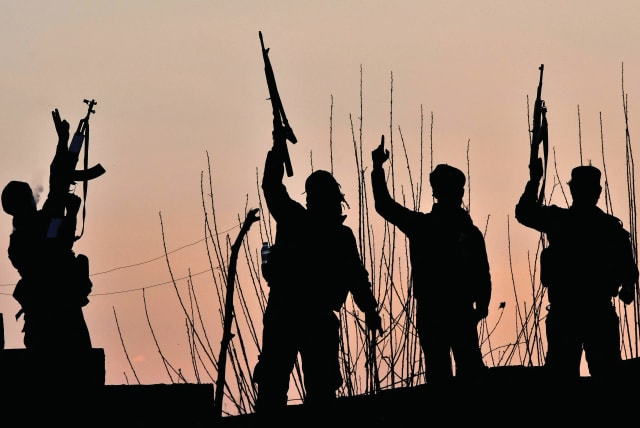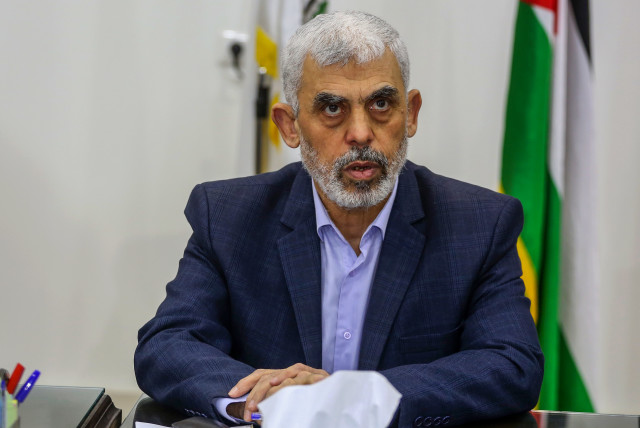Jihad: Where religion and murder meet - opinion

For the extremists, the jihadists, it’s critical to take them at their word when they cry “God is great” while raping, burning, and beheading.
Since the war with Hamas started, I’ve been following the news – and its nonstop analysis – mainly through podcasts. If I had to choose just a single episode to recommend, one that expertly explains what’s going on in the region – and ultimately the world – episode 340 of Sam Harris’s Making Sense would be my choice.
In 59 clear-eyed minutes, Harris explains what jihad is in Islam, what its goals are, and how to counter the inevitable horrific outcome. He may not change any minds – as if that’s possible in today’s polarized social media-fueled environment – but for those willing to listen, Harris’s sober elucidation provides a much-needed dose of reality.
In the episode titled “The bright line between good and evil,” Harris starts by bemoaning the fact that since October 7, “millions of people can’t do the moral arithmetic here or have confidently produced the wrong answer. [That’s] an enormous problem for open societies everywhere – because this should not have been confusing.”
Hamas’s October 7 massacre, Harris argues, “should have made it instantly clear, to everyone, certainly everyone on a college campus, that jihadist groups like Hamas are the permanent enemies of civilization.”
The opposite seems to have occurred.
How did we get to this place of such moral confusion?
Why do people not understand the murderous nature of jihad, Hamas?
It’s from a fundamental misconception where “we imagine that people everywhere want the same things: They want to live safe and prosperous lives. They want clean drinking water and good schools for their kids,” Harris says.
So if a particular group starts “behaving in extraordinarily destructive ways – practicing suicidal terrorism against noncombatants, for instance – they must have been pushed into extremes by others.”
You know, like Israel.
BUT IF it’s not Israel’s behavior that “explains the suicidal and genocidal inclinations of a group like Hamas,” Harris asks, then what motivates the terrorists?
Harris refuses to pull any punches: It’s religion that’s the problem here. Put starkly, “When you believe that life in this world has no value, apart from deciding who goes to hell and who goes to paradise, it becomes possible to feel perfectly at ease killing noncombatants or even using your own women and children as human shields.”
Indeed, if you take martyrdom and paradise seriously, “it becomes impossible to make moral errors,” Harris says. “If you blow yourself up in a crowd, your fellow Muslims will go straight to paradise. You’ve actually done them a favor. Unbelievers will go to hell, where they belong. However many lives you destroy, it’s all good.”
Harris insists he isn’t trying to tar all Muslims as jihadists. But for the extremists, it’s critical to take them at their word when they cry “God is great” while raping, burning, and beheading.
“For the jihadist, all of this sadism – the torture and murder of helpless, terrified people – is an act of worship. This is the sacrament,” Harris continues. “This is what you do for the glory of God.”
Anshel Pfeffer, writing in Haaretz, has said pretty much the same thing.
“Acknowledging that Hamas’s killers claimed to be acting in the name of their religion is not maligning Islam,” he notes. “It doesn’t mean they are the sole authentic representatives of a faith that has hundreds of millions of adherents. It is simply sticking to the facts. However, this is somehow inconceivable to almost every Westerner writing or opining on the events.”
If you don’t understand the role of religion in jihad, you can’t understand the problem Israel faces, Harris and Pfeffer stress.
It’s not even about Israel, not really.
During the last 40 years, there have been nearly 50,000 acts of Islamic terrorism, Harris quotes a French group that maintains a database of these attacks. “Ninety percent of them have occurred in Muslim countries. Most have nothing to do with Israel or the Jews.”
Yet, blaming Israel has somehow become embedded in woke ideology.
That’s how feminist organizations like CodePink can go “all in for Hamas and accuse the Israelis of genocide.” It’s how LGBTQ activists in the West can support Hamas “when they wouldn’t survive a day in Gaza… it boggles the mind,” Harris laments.
CAN ANYTHING be done before the world descends into unmitigated barbarism?
“Jihadism has to be destroyed in every way it can be destroyed – logistically, economically, informationally – but also in the most material sense, which means killing a lot of jihadists,” Harris says. “We can argue with their sympathizers. And we can hope to de-radicalize them. But we also have to kill committed jihadists. These are not normal antagonists with rational demands. These are not people who want what we want.”
Harris stresses that for change to stick, it has to be local.
“If the future is going to be remotely tolerable, the vast majority of Muslims have to disavow jihadism and unite with non-Muslims in fighting it. When hundreds of thousands of people show up in London to condemn Hamas or the Islamic State or any specific instance of jihadist savagery without ‘both-sides-ing’ anything, then we will know that we’ve made a modicum of progress.”
Pfeffer says the road to recovery starts with acknowledging reality.
To find a solution to the conflict, “accepting the fact that it’s above all a religious-nationalist conflict, and not some race-based and settler-colonial artificial concept imported from Western campuses, would be a good place to start,” he writes.
That’s going to be a tall order, and I’m not in the least bit convinced that either the Muslim world or the West is up to the task. If October 7 couldn’t convince them, what can? But without a sober understanding of who the enemy is, we will lose this war.
“We all live in Israel now,” Harris concludes. “It’s just that most of us haven’t realized it yet.”
The writer’s book Totaled: The Billion-Dollar Crash of the Startup that Took on Big Auto, Big Oil and the World is available on Amazon and other online booksellers. brianblum.com
Jerusalem Post Store
`; document.getElementById("linkPremium").innerHTML = cont; var divWithLink = document.getElementById("premium-link"); if (divWithLink !== null && divWithLink !== 'undefined') { divWithLink.style.border = "solid 1px #cb0f3e"; divWithLink.style.textAlign = "center"; divWithLink.style.marginBottom = "15px"; divWithLink.style.marginTop = "15px"; divWithLink.style.width = "100%"; divWithLink.style.backgroundColor = "#122952"; divWithLink.style.color = "#ffffff"; divWithLink.style.lineHeight = "1.5"; } } (function (v, i) { });

